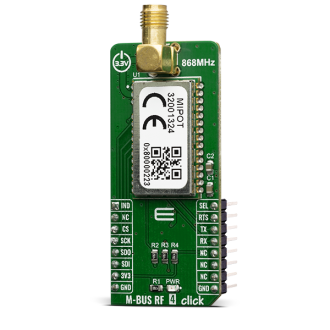
We strongly encourage users to use Package manager for sharing their code on Libstock website, because it boosts your efficiency and leaves the end user with no room for error. [more info]

Rating:
Author: MIKROE
Last Updated: 2019-10-14
Package Version: 1.0.0.0
mikroSDK Library: 1.0.0.0
Category: Sub-1 GHz Transceivers
Downloaded: 4381 times
Not followed.
License: MIT license
M-BUS RF 4 Click is a mikroBUS add-on board with a MIPOT 32001324 RF wireless transceiver. This module operates in the 868 MHz SRD Band.
Do you want to subscribe in order to receive notifications regarding "M-BUS RF 4 click" changes.
Do you want to unsubscribe in order to stop receiving notifications regarding "M-BUS RF 4 click" changes.
Do you want to report abuse regarding "M-BUS RF 4 click".

Library Description
The library provides the functions of sending commands and receiving data using UART communication. For additional commands and their form - and the number of parameters to be sent, look at the datasheet.
Key functions:
void mbusrf4_sendCommand( uint8_t command, uint8_t length, uint8_t *payloadBuff) - Send command - UART communicationvoid mbusrf4_setCommunicationMode(uint8_t mode) - Set communication SPI/UARTExamples description
The application is composed of three sections :
void applicationTask()
{
/* RX App mode */
if(fDataResp == 1 && _appMode == _MBUSRF4_USER_APP_RX_MODE)
{
mikrobus_logWrite ( " ----- NEW - RX DATA ---- ", _LOG_LINE );
_display_rxBuffer( 20 );
mikrobus_logWrite ( " ------------------------ ", _LOG_LINE );
fDataResp = 0;
}
/* TX App Mode */
if(_appMode == _MBUSRF4_USER_APP_TX_MODE)
{
mbusrf4_sendCommand( _MBUSRF4_CMD_TX_MSG, 18, &txBuffer[0] );
mikrobus_logWrite ( " --- SEND - TX BUFFER --- ", _LOG_LINE );
_display_rxBuffer( 5 );
mikrobus_logWrite ( " ------------------------ ", _LOG_LINE );
Delay_ms( 1500 );
}
}
Additional Functions :
Other mikroE Libraries used in the example:
Additional notes and informations
Depending on the development board you are using, you may need USB UART click, USB UART 2 click or RS232 click to connect to your PC, for development systems with no UART to USB interface available on the board. The terminal available in all MikroElektronika compilers, or any other terminal application of your choice, can be used to read the message.